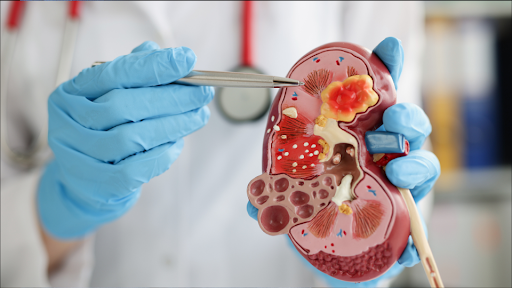Kidney stones can be an incredibly painful experience, often leading to confusion about where to seek medical help. With the rise of telehealth services, such as Doctronic, patients now have more options than ever before. This article will explore the symptoms of kidney stones, the differences between emergency rooms and urgent care facilities, and how to determine the best course of action for your situation.
 Understanding Kidney Stones
Understanding Kidney Stones
Kidney stones are hard deposits of minerals and salts that form inside the kidneys. They can affect any part of the urinary tract, from the kidneys to the bladder. Passing kidney stones can be extremely painful, often described as one of the most intense pains a person can experience. The pain typically occurs when a stone moves within the kidney or passes into the ureter, the tube connecting the kidney to the bladder, leading to a sharp, cramping sensation that can radiate to the lower abdomen and groin.
Common symptoms of kidney stones include severe pain in the back or side, pain during urination, blood in the urine, and a persistent need to urinate. If you experience these symptoms, it’s crucial to understand your options for treatment. In some cases, individuals may also experience nausea and vomiting as a result of the intense pain, which can further complicate the situation. It’s important to seek medical attention promptly, as untreated kidney stones can lead to serious complications, including urinary tract infections or even kidney damage.
Types of Kidney Stones
There are several types of kidney stones, each with different causes and treatment options. The most common types include:
Calcium Stones: These are the most prevalent type, often formed from excess calcium in the urine. They can be further categorized into calcium oxalate and calcium phosphate stones, each requiring different dietary adjustments to prevent recurrence.
Struvite Stones: These stones can form after an infection in the urinary system. Struvite stones are often larger and can grow quickly, making them particularly troublesome and requiring more aggressive treatment.
Uric Acid Stones: These occur when urine is too acidic, often linked to certain diets and conditions. Individuals with gout or those who consume a high-protein diet may be at increased risk for developing these types of stones.
Understanding the type of kidney stone is essential for determining the appropriate treatment and prevention strategies. For instance, dietary changes such as reducing sodium intake, increasing hydration, and moderating protein consumption can significantly impact the formation of certain types of stones. Additionally, some individuals may benefit from medications that help to dissolve stones or prevent their formation altogether. Regular check-ups and imaging tests can also play a vital role in monitoring kidney health and preventing future occurrences.
When to Seek Medical Attention
Deciding whether to go to the emergency room (ER) or an urgent care facility can be challenging, especially when dealing with the intense pain associated with kidney stones. Here are some guidelines to help you make that decision.
Emergency Room Situations
The emergency room is best suited for severe and life-threatening conditions. If you experience any of the following symptoms, it is advisable to go to the ER:
Unbearable pain that does not subside.
Signs of infection, such as fever and chills.
Severe nausea or vomiting that prevents you from keeping fluids down.
In these cases, the ER can provide immediate pain relief and necessary interventions, such as intravenous fluids or surgical procedures if needed. Additionally, the ER is equipped with advanced imaging technology that can quickly diagnose the presence and location of kidney stones, allowing for a more tailored treatment approach. Medical professionals in the ER can also monitor your vital signs closely, ensuring that any complications, such as kidney damage or sepsis, are promptly addressed.
Urgent Care Options
Urgent care facilities are designed to handle non-life-threatening conditions that require immediate attention. If your symptoms are severe but stable, you might consider visiting an urgent care center. Situations that warrant an urgent care visit include:
Moderate pain that is manageable.
Blood in the urine without other severe symptoms.
Questions about treatment options or follow-up care.
Urgent care centers can provide diagnostic tests, such as X-rays or ultrasounds, and can prescribe medication for pain management. They often have extended hours, making them a convenient option for those who cannot wait for a regular doctor's appointment. Furthermore, urgent care facilities can also assist with referrals to specialists, such as urologists, if ongoing treatment is necessary. This can be particularly beneficial for patients who may need to manage their kidney stones over time, as it allows for a more comprehensive approach to their health care needs.
Telehealth as an Option
In today's digital age, telehealth services like Doctronic offer an innovative approach to healthcare. With the ability to consult with a medical professional from the comfort of your home, telehealth can be an excellent first step in addressing kidney stone symptoms.
The Benefits of Telehealth
Using a service like Doctronic can provide several advantages:
Convenience: Access healthcare without the need to travel, especially during times of severe pain.
Cost-effective: Telehealth visits are often less expensive than traditional in-person consultations.
Immediate Access: Get answers to your health questions quickly, which can help you decide whether to visit the ER or urgent care.
With over 10 million users, Doctronic is revolutionizing patient care by offering free AI doctor visits. This innovative approach allows patients to receive accurate diagnoses and treatment recommendations based on the latest medical research.
How Doctronic Works
When you visit Doctronic, the AI synthesizes peer-reviewed medical expertise to provide comprehensive answers to your health questions. This means that even if you're unsure whether your symptoms warrant a visit to the ER or urgent care, you can receive guidance tailored to your situation.
Moreover, Doctronic remembers your previous interactions, offering a personalized experience that traditional healthcare settings may lack. This can be especially beneficial for patients who need ongoing support and follow-up care.
In addition to its core functionality, Doctronic also provides educational resources that empower patients to better understand their conditions. Users can access articles, videos, and FAQs that delve into kidney stones, their causes, and preventive measures. This wealth of information not only enhances patient knowledge but also promotes proactive health management, enabling individuals to make informed decisions about their treatment options.
Furthermore, the platform's user-friendly interface ensures that individuals of all ages can navigate the system with ease. Whether you are a tech-savvy millennial or an older adult who may be less familiar with digital health tools, Doctronic's design prioritizes accessibility. This inclusivity is essential in bridging the gap between patients and healthcare providers, ensuring that everyone has the opportunity to receive timely medical advice and support.
Making the Right Decision
Ultimately, the choice between the ER and urgent care will depend on the severity of your symptoms and your overall health condition. Here are some tips to help you make an informed decision:
Assessing Your Symptoms
Take a moment to evaluate your symptoms:
Rate your pain on a scale of 1 to 10.
Consider any additional symptoms, such as fever or vomiting.
Think about your medical history and any existing conditions that may complicate your situation.
If your pain is severe and accompanied by other alarming symptoms, it is best to head to the emergency room. However, if your symptoms are manageable, an urgent care visit or a consultation through Doctronic may be more appropriate.
 Consulting with a Professional
Consulting with a Professional
Using telehealth services like Doctronic can provide valuable insights into your condition. The AI can help you understand your symptoms better and guide you on the next steps. This can include recommendations for over-the-counter pain relief or advice on hydration and dietary changes to help manage your kidney stones.
Moreover, consulting with a healthcare professional through telehealth can save you time and reduce the stress of navigating a busy waiting room. Many patients find that discussing their symptoms in a comfortable environment allows for a more honest and thorough conversation. This can lead to more personalized care and tailored advice that fits your lifestyle. Additionally, telehealth platforms often have access to your medical history, enabling them to provide informed recommendations based on your unique health profile.
Understanding the Costs
Another crucial factor in deciding between the ER and urgent care is the cost associated with each option. Emergency room visits tend to be significantly more expensive than urgent care, often leading to higher out-of-pocket expenses. Insurance coverage can vary widely, so it’s essential to check your plan’s details regarding copays and deductibles. Urgent care centers often provide transparent pricing and may offer a more affordable alternative for non-life-threatening conditions. By understanding the financial implications, you can make a more informed choice that aligns with both your health needs and budget.
Preventing Future Kidney Stones
Once you've dealt with the immediate pain and discomfort of kidney stones, it's essential to focus on prevention to avoid future occurrences. Here are some strategies to consider:
Hydration is Key
Staying well-hydrated is one of the most effective ways to prevent kidney stones. Drinking plenty of water helps dilute the substances in urine that lead to stones. Aim for at least 8-10 glasses of water a day, and increase your intake if you live in a hot climate or are physically active. Additionally, incorporating hydrating foods like cucumbers, oranges, and watermelon can further enhance your fluid intake. Monitoring the color of your urine can also be a helpful indicator; pale yellow generally signifies adequate hydration, while darker shades may suggest a need for more fluids.
Dietary Adjustments
Making changes to your diet can also help reduce the risk of kidney stones. Here are some tips:
Limit salt intake, as high sodium levels can increase calcium in the urine.
Reduce animal protein consumption, which can increase uric acid levels.
Incorporate more fruits and vegetables, which can help maintain a healthy pH balance in the urine.
Consulting with a healthcare professional or using a service like Doctronic can provide personalized dietary recommendations based on your health history and kidney stone type. Furthermore, consider the benefits of specific foods known for their stone-preventing properties. For instance, foods rich in magnesium, such as nuts and whole grains, can help reduce the risk of stone formation. Citrus fruits, particularly lemons and limes, are high in citric acid, which can help prevent the formation of certain types of stones by inhibiting crystal growth.
Kidney Stone Pain? Know Where to Turn
Deciding whether to go to the ER or urgent care for kidney stones can be a daunting task, especially when faced with severe pain. Understanding your symptoms and knowing when to seek help is crucial for effective treatment. Telehealth services like Doctronic offer a convenient option for patients looking for guidance in managing their health. By leveraging modern technology, individuals can receive timely advice and support, ensuring they make informed decisions about their care.
Ultimately, whether you choose the ER, urgent care, or a telehealth service, the key is to listen to your body and seek help when needed. With proper care and preventive measures, the pain of kidney stones can be effectively managed, allowing for a healthier future.
Experience the Future of Healthcare with Doctronic
If you're facing the discomfort of kidney stones and need immediate, personalized medical advice, Doctronic is here to help. As the #1 AI Doctor, we're revolutionizing the way you receive care. Our free AI doctor visits provide you with fast, smart, and personal medical insights based on the latest peer-reviewed research. With Doctronic, you can get to know an AI doctor that remembers every detail of your health history and is available 24/7 for telehealth video visits in all 50 states. Join over 10 million people who have already experienced the convenience and quality of Doctronic's care. Skip the line. Talk to an AI Doctor Now, for free.



 Understanding Kidney Stones
Understanding Kidney Stones Consulting with a Professional
Consulting with a Professional